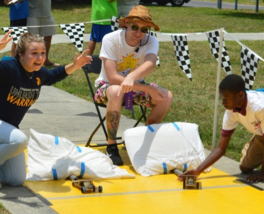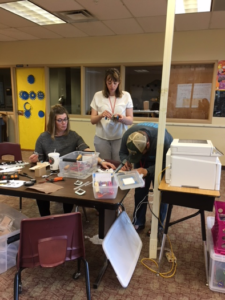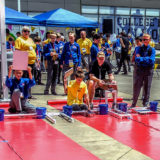April 16, 2018

STEM competitions like Junior Solar Sprint (JSS) where students design, build and race model-sized solar-powered cars provide excellent “photo ops.” The students are excited and animated, and the energy is comparable to a sporting event. But the truth is, so much of the work that goes into the event happens for months leading up to competition day.
At the heart of the JSS program is the educator — the person working with the student teams, facilitating discussion, providing guidance and a safe place to build, and the encouragement to risk failure and try again. That is why the Junior Solar Sprint: Connecting Communities with Opportunities for Success (JSS:C2OS) begins with professional development for teachers, mentors and educators, providing them the opportunity to experience the program through their students’ eyes.
JSS:C2OS is a pilot program that strives to identify and overcome equity issues that limit student participation. The U.S. Army Educational Outreach Program (AEOP) has provided funding to support the University of Central Florida’s Florida Solar Energy Center (FSEC) and the National Renewable Energy Laboratory (NREL) to engage more priority population and underrepresented students in STEM programs like JSS. Another focus of AEOP is the outreach to military dependents which was included as one of the objectives to the pilot program. FSEC and NREL have been involved with JSS since the early 1990s, providing professional development and technical assistance to educators and coordinating racing events.
Knowing how integral passionate and knowledgeable educators are to students’ success, FSEC and NREL kicked off the JSS:C2OS program by holding professional development workshops in Florida and Colorado for teachers located on or by military bases, afterschool care providers and JSS mentors. At the teacher workshops, educators learn about solar technology through hands-on experiments and work in groups to design, build and test the performance of their own solar-powered vehicles on a track, modeling what they would eventually do with their student teams. Educators team up and are set loose in a room with materials, tools and equipment to design and build their projects. Each team receives a three-volt solar panel and small motor (JSS kit). Available to the entire cadre of participants are a variety of building materials, including items for axles, wheels, chassis, gears, etc. Safety equipment is provided safety rules are reviewed. Through the workshop, educators become students—no better way to prepare for the months of team guidance ahead.
An important part of the day is sharing results. Each team presents their vehicle to the rest of the group, answers questions, and explains their approach to building and testing the vehicle, which is similar to what students experience during competition. The day ends with each participant walking out the door with one or more kits and the know-how to implement JSS with their own student teams.
Celebrating and encouraging competition is a wonderful way to build a love for and confidence in STEM subjects. Taking time outside of the classroom to find the fun in STEM is important to building a STEM-literate society and to reaching priority population students in STEM subjects in school settings. Just like classroom work, the primary ingredient for success is a well-supported, knowledgeable and passionate teacher. Let’s not lose sight of this as we keep up the good and important work.


JSS Workshop at FSEC, January 2018

Junior Solar Sprint (JSS)
Junior Solar Sprint (JSS) is a competition for middle school students to create the fastest, most interesting and best crafted solar-vehicle possible.
More About Junior Solar Sprint (JSS)Find a Volunteering Opportunity
Visit our Program Volunteers page for a tool to find the best opportunity for you.
eCYBERMISSION Mini-Grant
The eCYBERMISSION Mini-Grant is intended to support teachers/program leaders as they implement eCYBERMISSION with their teams. Educators (formal and informal) of students in grades 6-9 are encouraged to apply.
